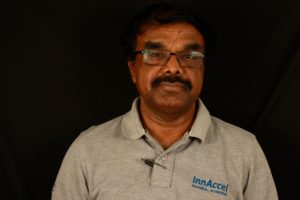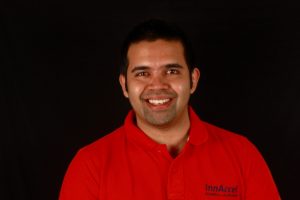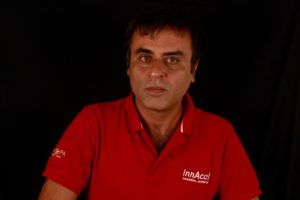InnAccel, which was initially founded as India’s first medtech incubator turned the tables when founders realised that most ventures in India were not solving a critical healthcare need, which would prove sustainable to all stakeholders. Now, as a product innovation company, it has set itself a goal of launching 25 critical products in India by 2025.



In April 2013, when we carried a story about the opportunity India presents, in the affordable healthcare space, Jayant Sinha, the former managing director of Omidyar Network had made an interesting observation, that; the challenge in delivering quality healthcare lies in accessibility, availability and affordability. And, by innovating, entrepreneurs and investors can do financially well by also doing good.
I bring this up here, for when we caught up for a story with Siraj Dhanani, the co-founder of InnAccel, a medical products innovation company, he seemed to share similar views about the misconception veiling the notion of social impact in healthcare. “An interesting observation I made is this unfortunate tag of “social impact”. It is almost assumed in India that a social impact venture will be less profitable or unprofitable just because it is making a social impact. This is wrong,” he opines. Instead, he believes that if a product or service is solving a society’s pain in the right manner, it should generate higher profits because a larger portion of the society will pay for the value it delivers. “In other words, commercial consideration should be the front and centre of social impact- at least in healthcare, as there is no impact without use, and no use without purchase,” he states.
The Back Story
Dhanani’s strong views about the perception and need for innovation in India’s healthcare industry come from two fronts; one, his own experience of over a decade in the Pharma and healthcare industry (when he also co-founded Baring India-backed PharmaARC Analytics which was later sold to IMS Health), and from having kick-started his second, current venture, InnAccel with the goal of being the first incubator for medical innovation startups in India. “We initially founded InnAccel in 2012, with a vision of helping startups gain engineering and product development expertise, sufficient capital, and other support to succeed,” he recalls. But, 12 months to 18 months into the venture and Dhanani and his co-founders, Dr. Jagdish Chaturvedi and A. Vijayarajan, realised that that many, if not most, startups were not working on critical needs that could be solved in an economically sustainable manner for all stakeholders.
Hence, InnAccel decided to capitalise on that opportunity. It started using the Stanford Biodesign process extensively to identify and validate critical unmet needs in India, and over time, built a database of 25 to 30 critical, validated, needs across five therapeutic areas. “We decided to start our internal projects based on the top needs, and thereby morphed into a multi-product medtech company,” he shares.
The goal, for the now 30-member team is to be a global leader in medtech innovation in emerging markets by 2025. Operationally, this amounts to launching 25 critical products in India, which can impact 25 million lives. Currently, that number stands at three (device launches), for which global patents have been filed.
It’s not just about money
A look at the Unitus Seed Fund Medical Devices Ecosystem Report (May 2015) reveals that while the innovation ecosystem in India has witnessed a steady growth, it has seen a surge in PE funding (since 2005) only in 2012 and 2013, during which period, 18 investments were made with a deal value of US $226 million. “In India, the MedTech funding ecosystem is in its infancy from a VC perspective. Most funds do not have professionals with expertise in this area, and do not appear to have a well-formed strategy on what will work in the Indian market,” opines Dhanani. However, he notes that the grant funding ecosystem is thriving, with significant funds made available, at the right stages, to startups. For example, the Department of Biotechnology, through its Biotech Ignition Grant Program, provides up to Rs. 50 lakh for researchers and companies to take an idea to prototype stage.
When it comes to areas of medtech innovation, Dhanani and his team have a close watch on active implants, which can modulate the body’s functioning using electrical signals. Dhanani further explains that these have a wide range of applications, including cardiovascular, Parkinsons, pain management, sleep apnea, amongst others. “This area is rapidly advancing with pharmaceutical companies also foraying into it,” he adds. The stream now seems to have its own buzzword; electroceuticals.
A second area that the team is kicked about is minimally invasive surgeries because it offers a safer, and sometimes, more economical alternative to full surgery. And, tools and technologies that enable such surgery, and reduce the skill required in MIS, are another interesting area of development for the team.
“It is almost assumed in India that a social impact venture will be less profitable or unprofitable just because it is making a social impact. This is wrong. If I am solving society’s pain in the right way, I should generate high profits as society will pay for value.”
Looking Ahead
The grouse for Dhanani still remains that not many startups are working on needs that are economically and clinically compelling. Most ventures are building a different version of an existing Western device, primarily to reduce costs, he points out. “While re-engineering is not wrong, it misses the fundamental point of whether the existing device fits our healthcare system, and if so, is it the most optimal way to address a problem,” he states.
Hence, with a strong leadership team and an already passionate 30-member team, Dhanani has set out to do what he initially felt he could enable other medtech startups to; to develop innovative solutions to solve a critical need in an economically sustainable manner for all stakeholders.
A Must Know for Healthcare Entrepreneurs

Did You Know?
The InnAccel founding team comprises a culmination of three successful healthcare professionals; Dhanani, who earlier founded PharmaARC Analytics which was later sold to IMS Health, Dr. Jagdish Chaturvedi, a clinician who was recently recognised as a Top Innovator under 35 by MIT Tech Review (for having been involved in over 10 critical MedTech inventions so far) and Vijayarajan, who led product development at GE Medical, when it first came to India as Wipro GE.